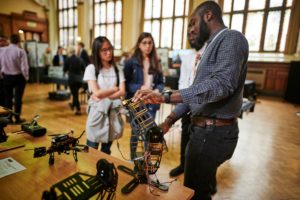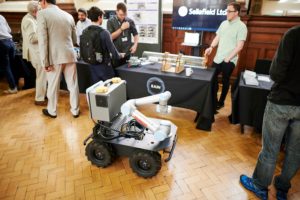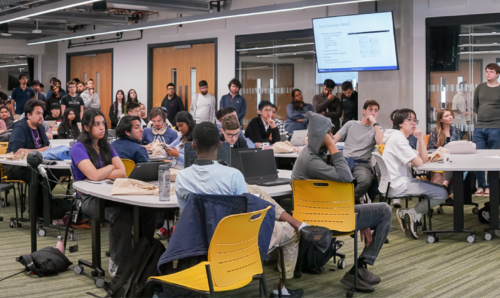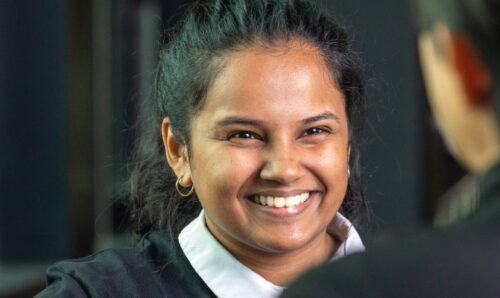Explore MSc Advanced Control and Systems Engineering
Student experience 26 May 2020
Yu-Hsiang Su graduated from MSc Advanced Control and Systems Engineering in 2019 and was awarded the Department MSc Success Scholarship to fund his PhD study. Here he talks about the content of the Masters course and provides some study tips.
What is the course like?
There are eight modules and one dissertation in this MSc course. In the first semester, you will start from the fundamentals of classical control theory and MATLAB programming practice. Then it comes to the system identification where you are going to study how to build a model for your system and how to analyse the accuracy of your model. In the state space and multivariable control, you will start learning the basic modern control theory by using matrix and linear algebra to represent your model and design your controller. The last module of the first semester is the model predictive control and process control. By the end of the first semester, you will be really familiar with designing the classical PID controller in both continuous and discrete form and the basic control performance analysis.
In the second semester, the modules get more difficult including advanced control subjects such as nonlinear and adaptive control, and optimal and robust control. You’ll learn the mathematics behind the control theory and its real-life applications. Robotics and autonomous systems and applied control are two of the most practical subjects of all the modules in this MSc course. You will be given a mobile robot for practising your control design skills with a series of assignments, including speed control for the motor, obstacle avoidance and line tracking. For applied control, you will learn a new software program, LabVIEW, to design controllers.
By the end of the modules, you would have learned how to build models for your system using different methods and design controllers based on different properties and requirements to achieve your desired control performance. This knowledge and the practical skills from this MSc course are useful in either your future career as a control engineer or – like me – your future PhD study in academic research.
What is the most important software in this course?
As an engineering student, you will often use software and programming skills for your research and projects. Two software that you will have to master are MATLAB and LabVIEW so I suggest getting familiarised with those because you’ll use them almost every time in coursework and reports.
Is there going to be a lot of programming and what skill level is required?
The course would often require MATLAB and LabVIEW but the sample code will be provided in most of your lab and coursework. So, you don’t really need to program from scratch and you don’t need to worry too much that you are not an advanced programmer.

How much lab and coursework is there?
Generally speaking, there is either one lab and report or two courseworks in each subject. You will be given around two weeks to finish the lab and your report and one week to submit your coursework.
Any study tips?
I always believe in work (study) hard and play hard. Here are some tips to learn new knowledge and work efficiently in studying and research:
- Always attend the lectures. The university records each lecture and provides podcasts online but it is important to interact with your lecturers because you’ll have the opportunity to ask questions and reflect problems immediately.
- Prepare and ask questions. Beyond the lectures, don’t hesitate to approach teaching assistants (TAs) as they are always helpful in doing the experiments, organising the knowledge from lectures, and discussing the direction of your reports. Take the initiative to ask questions and gain a deeper understanding from the excellent academic staff.
- Make sure you follow the schedule and progress. This one-year MSc course is really intensive with daily lectures, loads of coursework and lab for each subject, the final exam and dissertation. Following the guidance given by your lecturers and making your own study schedule according to the timetable will help your study easier and more efficient.
- Review the lectures every day. From my experience, spending at least 1-2 hours to review the lecture every day after the class helps save a lot of time on the revision period. By reviewing immediately, you can strengthen your memory of the new knowledge and also find out your problems. So, it’s always smarter and more time-efficient to start reviewing lectures earlier and step by step.
How to prepare for exams?
70-80 per cent of your mark in each subject depends on your final exam. It’s undoubtedly important to study hard before your exam. In each semester, you will have four final exams and around a whole month to prepare for the exams. Here are some tips to ace it:
- Attend the revision class. There will be a revision class for each subject before your final exam. It’s useful to attend these to have a general idea of what’s going to be in the exam because students often miss the focal point of the subject. The lecturer will highlight the main concepts and solve past exam questions so I highly recommend reviewing briefly before the revision class because it’s an opportunity to ask questions.
- Solve past exams. The University provides past exam papers of each subject for students to practise. Before digging into the past exam papers, make sure you confirm with your lecturers that the past exam papers are related to this year’s exam. Then try solving the past exam papers by yourself at least once without checking the solution to make sure you have already understood the concepts of each question.
- Take notes. I always find it helpful to memorise and organise the new knowledge and concept by making your own notes while preparing for the exam. I would take notes during lectures and while revising, and note my mistakes and the concepts I missed when I practise with past exam papers. With this, you would have customised notes for your study routine.
Tips for doing the Dissertation?
You’ll have around 3 months to do your dissertation after the second semester exam. It seems long but to be frank, it is not. So, it’s important to work hard and also work smart by following these tips:
- Keep in touch with your supervisor. Always remember that it’s your own dissertation and therefore it’s your responsibility to contact your supervisor. I reported my progress and discussed with my supervisor weekly by either face-to-face or skype meeting during the dissertation period. I recommend to always send your draft of the dissertation to your supervisor to seek suggestions and feedback.
- Time management. It is important to manage your time well because three months is really short. Set up a brief idea with your supervisor as soon as possible after you have been allocated with the topic and start reviewing the literature after the second semester exam. I suggest saving at least a month to write your dissertation in order to explain your idea and results thoroughly.
The MSc Advanced Control and Systems Engineering Course helps solidify your foundation and provide you with more advanced theory and knowledge in control engineering while strengthening your practical skills and research ability through lots of labs and the final dissertation. You also have the opportunity to work on the novel research topics such as machine learning applications, autonomous robotics, and UAVs with excellent academic staffs. This MSc course was an amazing experience for me and I wish you’d enjoy it too, and best of luck!
Find out more about taught master’s courses here
Advanced Control and Systems Engineeringinternational studentMScpostgraduateStudent experience






Leave a Reply